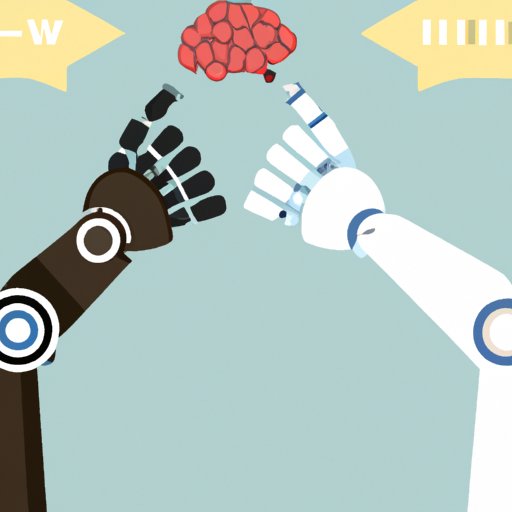Introduction
The question of when robots will take over has been discussed for decades. As technology advances, the prospect of robots replacing humans in certain areas of work is becoming more of a reality. This article will explore the potential for automation to replace human jobs, the ethical and societal implications of a robot takeover, the technological advances needed for robots to take over, and the possibility of human-robot cooperation in the future.
Examining the Potential for Automation to Replace Human Jobs
Automation has already begun to replace certain types of human labor, such as factory work. According to a 2017 report from the McKinsey Global Institute, “45 percent of the activities people are paid to do can be automated by adapting currently demonstrated technologies.” These activities include data collection and analysis, customer service, and repetitive physical tasks. In the manufacturing industry, robots have already taken over many of the tasks that used to require manual labor. This automation has allowed companies to become more efficient and cost-effective.
However, automation also presents some drawbacks. For example, automation can lead to job loss and increased inequality. According to a study by the National Bureau of Economic Research, “automation has displaced an estimated 6 million U.S. workers since 2000.” This displacement has had a particularly negative impact on low-wage workers, who are more likely to be replaced by machines than their higher-paid counterparts. Additionally, automation can lead to greater economic inequality between those who own the robots and those who are displaced by them.

Exploring the Ethical and Societal Implications of a Robot Takeover
The potential for robots to take over human jobs raises important ethical and societal questions. For example, if robots take over a majority of the world’s jobs, how will wealth and resources be distributed among humans? It is possible that automation could lead to an unequal distribution of wealth, with those who own the robots reaping the majority of the benefits while those without access to the technology fall further behind. Additionally, automation could lead to a decrease in social interaction, as humans no longer need to interact with each other to perform daily tasks.

Analyzing the Technological Advances Needed For Robots to Take Over
In order for robots to take over human jobs, there must be significant technological advances in both artificial intelligence (AI) and robotics. AI is a type of computer science that enables machines to think and act like humans. It is used to create systems that can make decisions and solve problems autonomously. Robotics, on the other hand, is the branch of engineering that deals with the design, construction, and operation of robots. In order for robots to be able to perform complex tasks, they must have advanced AI capabilities as well as sophisticated hardware and software.

Investigating the Legal Rights of Robots in a World Dominated by Machines
If robots take over a majority of the world’s jobs, it is likely that laws governing robotics will also need to be established. Such laws would need to address issues such as the rights of robots, the responsibilities of their owners, and the potential for abuse. For example, robots could potentially be used to commit crimes or invade personal privacy. Therefore, it is important that any laws governing robotics are designed to protect both humans and robots.
Evaluating the Possibility of Human-Robot Cooperation in the Future
Despite the potential for robots to take over human jobs, it is also possible that robots and humans could work together in the future. A recent study by the World Economic Forum found that “collaborative robots and humans can work together to achieve better outcomes than either alone.” This type of collaboration could lead to increased efficiency and productivity, as well as improved safety and quality of life for both humans and robots. However, it is important to note that any collaboration between humans and robots must be carefully monitored to ensure that robots are not taking advantage of humans.
Conclusion
This article has explored the potential for robots to take over human jobs, the ethical and societal implications of a robot takeover, the technological advances needed for robots to take over, and the possibility of human-robot cooperation in the future. While robots have already begun to replace certain types of human labor, it is clear that there are still many challenges that must be addressed before robots can fully take over. Additionally, it is important to consider the potential implications of a robot takeover, including the unequal distribution of wealth and resources, the impact on social interaction, and the potential for robots to be abused. Finally, it is essential to consider the possibility of human-robot collaboration, as this could lead to improved efficiency and productivity for both humans and robots.
(Note: Is this article not meeting your expectations? Do you have knowledge or insights to share? Unlock new opportunities and expand your reach by joining our authors team. Click Registration to join us and share your expertise with our readers.)
